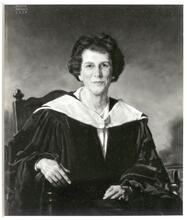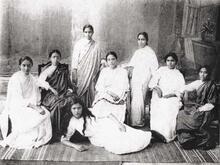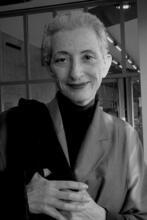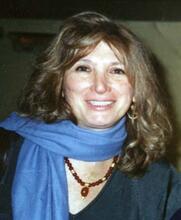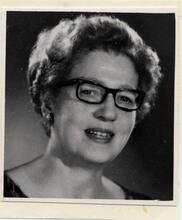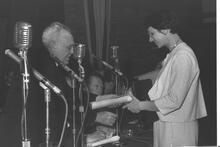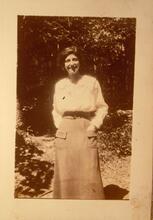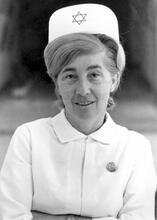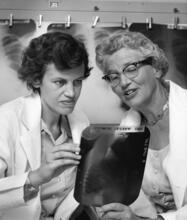Luba Robin Goldsmith
A respected doctor and teacher of medicine, Luba Robin Goldsmith created a supportive environment for women who followed her into medicine. Goldsmith was the first woman admitted to the medical school of the University of Pittsburgh, where she was later the medical advisor to female students and taught in both their dental and education schools. She also taught courses on medical and social problems at what would later become Carnegie-Mellon. Outside of teaching, she opened a private practice in Pittsburgh, and served as the city’s first chief tenement inspector. In addition, Goldsmith served as national chair of the United States Public Health Advisory Committee and chair of the public health committee of the National Council of Jewish Women.
In 1902, Luba Robin was the first woman to graduate from the school of medicine at the Western University of Pittsburgh (later the University of Pittsburgh). The board of directors of the medical school had met several times before they acted affirmatively on her application for admission, the first ever received from a woman. Luba Robin’s career combined private medical practice, teaching, writing, lecturing, and active participation in educational, social, and public health work.
Education and general medical practice
Luba Robin was born on January 17, 1879, in Uman, Ukraine. She immigrated to the United States with her parents, Nathaniel and Beatrice Robin, when she was fifteen years old. The family settled in Pittsburgh, where Luba graduated from high school and the medical school of Western University of Pittsburgh. She paid her own way through school, working as a bookkeeper, doing entomological work at the Carnegie Museum, and acting as part-time secretary to a local merchant. After graduation, she did postgraduate work at the University of Pennsylvania. She returned to Pittsburgh, where she married Dr. Milton Goldsmith on March 25, 1905. The Goldsmiths left Pittsburgh for Vienna and Berlin, where they studied for eight months. Luba Goldsmith entered general practice soon after her return to Pittsburgh.
From tenement inspection to academia
“Dr. Luba,” as she was affectionately known, worked on civic and health problems in the community from the earliest days of her career. She was the first chief tenement house inspector in the city and advocated for the purification of city water. From 1915 to 1919, she was medical adviser to women students at the University of Pittsburgh. Goldsmith was the author of a scientific paper, “The Aberhalden Test for Pregnancy.”
Goldsmith taught physiology at the University Dental School for four years as an assistant professor; she later taught in the School of Education. She gave courses in medical and social problems at the Margaret Morrison School of the Carnegie Institute of Technology (Carnegie-Mellon University).
A popular lecturer on health topics in schools, clubs, and churches, she remained active in public health movements in Pittsburgh and other cities throughout the Northeast. She served as national chair of the United States Public Health Advisory Committee. She chaired the public health committee of the National Council of Jewish Women.
Writing and other activities
Goldsmith’s avocation was the theater. She wrote several plays on health themes, including Who Cares? (a copy of which survives at the Brown University Library), a health fantasy, and What Next?, described as “a picture from life.” She wrote articles called “The Art of Jewish Living” and “Jewish Legends,” and authored a play entitled East and West.
Luba Goldsmith was a founding member of the Alpha Epsilon Phi sorority chapter at the University of Pittsburgh and was a member of the National Council of Jewish Women, Hadassah, College Club, Civic Club of Allegheny County, American Association of University Women, Women’s International League for Peace and Freedom, American Medical Association, Women’s National Medical Society, Allegheny County Medical Society, and Rodef Shalom Congregation.
Legacy
She died in October 1931 at age fifty-two. She was survived by her husband and two sons, Norman and Albert.
A medical scholarship was established at the University of Pittsburgh as a permanent memorial to her. The money for the scholarship fund was raised by a committee of women who believed that “the influence of this woman, whose life service was so far reaching, will always be alive.” Luba Robin Goldsmith achieved in her life the goals to which many contemporary Jewish women aspire—combining family and social service.
“Civic and Health Problems Sponsored by Dr. Goldsmith.” Pittsburgh Post-Gazette, February 17, 1931.
“Dr. Luba Goldsmith Dies.” Pittsburgh Press, October 17, 1931.
“Medical Scholarship Planned as Tribute to Woman Physician.” Pittsburgh Press, January 10, 1932.
“Pitt Jewish Medical Student with Highest Record to Get Fund.” Pittsburgh Sun-Telegraph, May 29, 1932.
“Who’s Who in Pittsburgh Jewry.” Jewish Criterion, September 19, 1927; WWIAJ (1926, 1928).
Interviews with anonymous women for study, “Ethnicity and Mental Health,” sponsored by the American Jewish Committee, 1976.
Interview with Esther Morrow, Pittsburgh, January 2, 1997.

